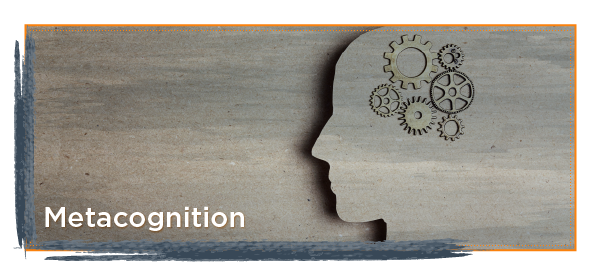Metacognition

I recently read a short article about “Meta Cognition” that reminded me of a conversation I had with a former manager early in my professional career. Distilled to its essence, the manager saw some potential in me and wanted to influence me to be able to “think higher.” As I read the “Meta Cognition” article, I thought about what that manager was referring to as “Higher Thinking.”
Whatever label you place on it, the idea of thinking differently – more advanced, perhaps, with an ability to solve greater problems and think in ways I have not done so previously – was fascinating to me. At 19, I had chosen to enter the workforce prior to college, and so that “enlightenment” that can accompany the college experience was new to me. And very exciting.
Culled through the intervening years, here are my five favorite Metacognitive skills to practice. There are plenty more, to be sure, but since it’s my blog, you’re stuck with the ones I like best and have found most useful personally. I hope they are as impactful for you.
Know You Don’t Know it All:
Knowing the gaps in your own knowledge is key, but knowing what you don’t know is a real paradox! Once the gaps (which in my case often appear as chasms) are known, you are better aware of what needs bridging in your thinking. I used to think I had a secret fool-proof formula for leading others. It was boiled down to three elements I believed to be true for anyone I was going to lead; turns out the simplicity was a limitation in my knowledge in an attempt to make a very complex job easy.
Prepare Properly:
As Benjamin Franklin was quoted: “Failing to prepare is preparing to fail”… if he had a mic, it would be dropped now. So let’s focus on proper preparation. There is such a thing as over prepping (of which I have never been accused). The “proper” amount of preparation utilizes our energy well enough to have a solid plan and tactical approach to our day or work, yet allows for flexibility and agility as variables change.
Seek Out Feedback:
This is a great way to potentially close the gap on some of your knowledge gaps! Get out there and ask for feedback, and be open to what you hear. One of Emergent’s favorite activities with leaders for seeking out feedback is asking people you work with to fill out an index card with the following: one thing that you could stop doing, one thing that you could start doing, and one thing that you must absolutely keep doing that you are already doing. This “Start, Stop, Continue” exercise can be very revealing about your leadership activities and can help you perform better in the eyes of those you work with.
Journal or Keep a Diary:
Writing your thoughts and reflections has a profound impact on your development. Research suggests that more than 400 times the neurons fire in our brains when we write than when we speak, listen, or type. That’s right, write – good old pen and paper. Choose a meaningful journal prompt such as “I am grateful for” or “Today was … for me” and get writing!
Ask yourself better questions:
The key to great coaching and leadership is asking great questions. The power of our questions to ourselves and others will elicit deeper reflection and thought, as well as more creative outcomes. Ask yourself and others more open-ended and empowering questions… then listen for deeper ideas and answers being shared.
What did you take away from this blog post and would like to know more about? Reach out to me and let me know at bill@getemergent.com or our entire team at support@getemergent.com.
Be well and thrive!

Hey Bill
Loved this. Keep them coming.
another Bill ( Raineri) fiend of Ralph’s
Thanks Bill, enjoyed these insights.